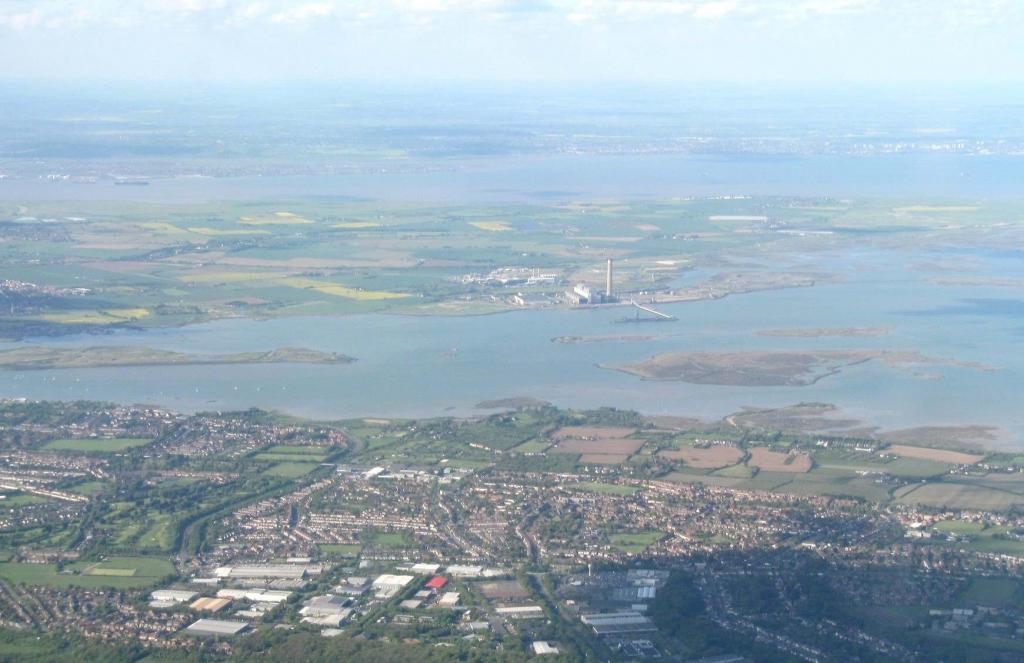Thessaloniki gets ready for its metro launch in November
The underground rapid transit lines have been under construction for almost two decades due to various project delays
 TheMayor.EU logo
TheMayor.EU logo 
The Isle of Grain and local power station, seen from above, Source: Steve Knight on Flickr, CC BY 2.0
The NeuConnect cable will pass under the North Sea and will be capable of transporting 1,400 megawatts of electricity
Today, the European Investment Bank (EIB) announced that work to build the NeuConnect will start this year. The project envisions a 2.8-billion-euro investment that will see the United Kingdom and Germany connect their energy grids for the first time. The connection is expected to start operating in 2028.
The energy link will pass under the North Sea through German, Dutch and British waters. A massive 725-kilometre cable will run from Germany’s convertor station in Fedderwarden near Bremerhaven to the UK’s Isle of Grain, near the mouth of the River Thames.
The German-British energy connector is one example of a mutually beneficial arrangement and a definite improvement in relations since Brexit was finalized. The project involves the cooperation of 20 international banks, including the European Investment Bank and the Japan Bank for International Cooperation.
The connector itself will likely ease trade between the two sides and contribute to the introduction of high shares of intermittent renewable energy across the North Sea. The connector consists of a high voltage direct current link between the two converter stations, with a capacity of 1,400 megawatts and 525 kilovolts.
According to a statement by the EIB, the interconnector will make the use of offshore wind farms more efficient, which will support the UK’s and Germany's renewable energy policies.
EIB Vice-President Ambroise Fayolle was quoted in a press release, explaining that the project would be a key factor in the sustainable energy transition, precisely because of its wind energy use potential. Furthermore, cross-border electricity trade will help direct energy to where it needs to go the most. In turn, this would contribute to the stability of the energy grid on both sides of the North Sea.

The underground rapid transit lines have been under construction for almost two decades due to various project delays

Now you can get your wine in Talence by paying directly in Bitcoin

That’s because the state has to spend money on updating the railway infrastructure rather than subsidizing the cost of the popular pass

Rethinking renewable energy sources for the urban landscape

The examples, compiled by Beyond Fossil Fuels, can inform and inspire communities and entrepreneurs that still feel trepidation at the prospect of energy transition

Now you can get your wine in Talence by paying directly in Bitcoin

The 10th European Conference on Sustainable Cities and Towns (ESCT) sets the stage for stronger cooperation between the EU, national and local level to fast track Europe's transition to climate neutrality.

At least, that’s the promise made by the mayor of Paris, Anne Hidalgo

The underground rapid transit lines have been under construction for almost two decades due to various project delays

At least, that’s the promise made by the mayor of Paris, Anne Hidalgo

Hostal de Pinós is located in the geographical centre of the autonomous region

Despite its church-y name, the district has long been known as the hangout spot for the artsy crowds

Urban dwellers across the EU are having a say in making their surroundings friendlier to people and the environment.

Forests in the EU can help green the European construction industry and bolster a continent-wide push for architectural improvements.

Apply by 10 November and do your part for the transformation of European public spaces

An interview with the Mayor of a Polish city that seeks to reinvent itself

An interview with the newly elected ICLEI President and Mayor of Malmö

A conversation with the Mayor of Lisbon about the spirit and dimensions of innovation present in the Portuguese capital














